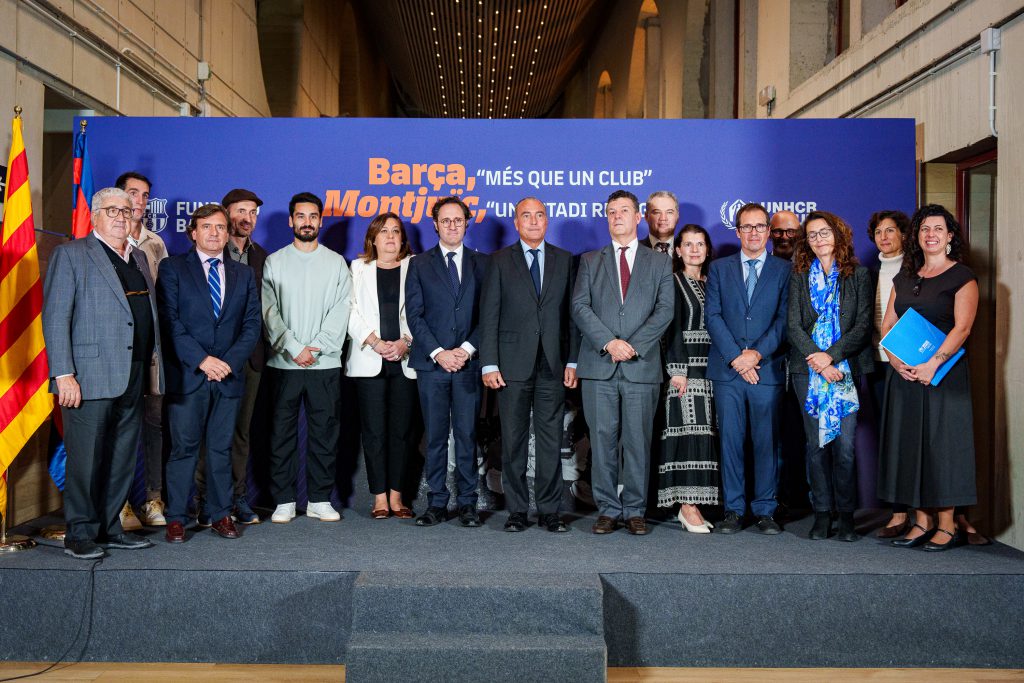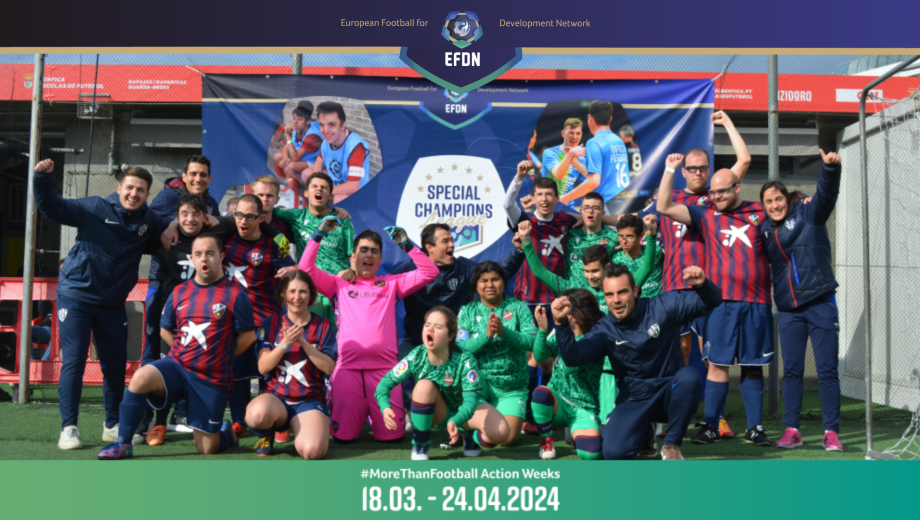FC Barcelona Foundation’s Exhibition: Montjuïc A Stadium of Refuge
The FC Barcelona Foundation and UNHCR present an exhibition on the lives of displaced people who found refuge in Montjuïc Stadium during the Spanish Civil War.
The Institutional vice president of FC Barcelona, Elena Fort, and the Director of the UNHCR’s Regional Bureau for Europe, Philippe Leclerc, and FC Barcelona player Ilkay Gündogan, inaugurate the exhibition: Barça, “More than a Club”, Montjuïc, “a stadium of refuge”, at the Lluís Companys Olympic Stadium

Between the autumn of 1936 and the spring of 1937, in the midst of the Spanish Civil War, the Lluís Companys de Montjuïc stadium hosted more than 21,000 displaced people from different parts of the peninsula. The Polish-born photographer Margaret Michaelis captured the day-to-day life of thousands of families (fathers, mothers, children and young people) who passed through the stadium. Today, the Montjuïc stadium is the provisional home of FC Barcelona and the Club, through its Foundation, wishes to highlight the role of this stadium, which took in thousands of people fleeing the Civil War.
The opening ceremony of the exhibition took place in the Sala Cupra of the Lluís Companys Olympic Stadium and was attended by the Institutionsl vice president of FC Barcelona, Elena Fort, the Director of the UNHCR’s Regional Bureau for Europe, Philippe Leclerc, the Corporate Manager of the FC Barcelona Foundation, Paco Sanz León, and the Director of the Olympic Ring’, Carme Lanuza. First-team player and High Profile Supporter, Ilkay Gündogan was also in attendance, accompanied by his wife Sara Arfaoui.
Everyday life
The collection of images in the exhibition shows the daily life of the people who found refuge in the Olympic Stadium, which transformed some of its rooms to be able to attend to those forced to flee their hometowns because of the war. The photographs show how they attended classes in the classrooms set up in the stands or directly on the grass, taking part in physical activity and sports sessions, performing domestic chores such as cooking, hanging out the washing or sewing, how they received medical and dental care, or simply everyday scenes from the canteens set up in the stadium, which had been converted into a centre for displaced people.
With this exhibition, FC Barcelona, its Foundation and UNHCR want to raise awareness of the situation suffered by more than 110 million refugees and forcibly displaced people in the world today. At the same time, they want to draw a parallel with the people who have had to leave their homes fleeing the war in Ukraine. As happened with the Montjuïc stadium 87 years ago, another sports venue, in this case the Arena Lviv, in the Ukrainian region of Lviv, which hosted Shakhtar Donetsk when the conflict broke out in Donbas in 2014, was converted last year into a refuge for 170 people displaced by the war, who live on the upper floor of the stadium.
The refugee cause
The Champions League match against Shakhtar Donetsk on Wednesday 25 October is a good opportunity to talk about this sad parallel and to again raise awareness about the reality of refugees, one of the great challenges facing the world today, which unfortunately is on the increase due to the emergence of new crises, and the reactivation and worsening of several conflicts. An example of this is the full-scale invasion of Ukraine by Russia last year, which continues, the current conflict in the Middle East, as well as the conflict in Sudan and the many other emergencies that are causing a high mortality rate among the civilian population and a high number of refugees and internally displaced people in these areas.
This firm position of FC Barcelona and its Foundation in favour of the refugees’ cause, strengthened by the global alliance with the United Nations Refugee Agency (ACNUR-UNHCR), has made this exhibition possible, thanks to an original idea by and the collaboration of Panenka magazine.
“This exhibition perfectly encapsulates the way we see sport as an unbeatable tool for building a better world. It’s a huge story of commitment and solidarity, at a point in history where unfortunately we are once again seeing images of women, children and men finding emergency refuge in football stadiums in Europe and across the whole world, like what happened here over 80 years ago.
FC Barcelona stands in favour of peace and against the death of innocent children and young people, whatever side of a conflict they are on, and asks that human rights and international humanitarian law be respected in order to save the lives and ensure the safety of civilian populations around the world. For that reason, we back the cause of refugees and displaced people, members of the civilian population that end up suffering from the consequences of conflict.”
Elena Fort, institutional vicepresident of FC Barcelona
Every year, millions of people are forced to flee their homes to escape conflict and persecution. We see record numbers every year and, to date, there are over 110 million forcibly displaced people in the world. UNHCR delivers life-saving aid and protection in emergencies, advocates for access to asylum. improved asylum laws and inclusion, so displaced people can access their rights. We help to find long-term solutions to build a future in a new country, or return home once safe. Today we focus on the fantastic power of sport to create a spirit of solidarity, helping refugees to integrate in host communities, and to improve the lives of displaced people. We strongly value the engagement of FC Barcelona and its Foundation as well as football fans around the world.
Philippe Leclerc, Europe Bureau director of UNHCR
DFB – Football United Against Racism
DFB Foundations Programmes




